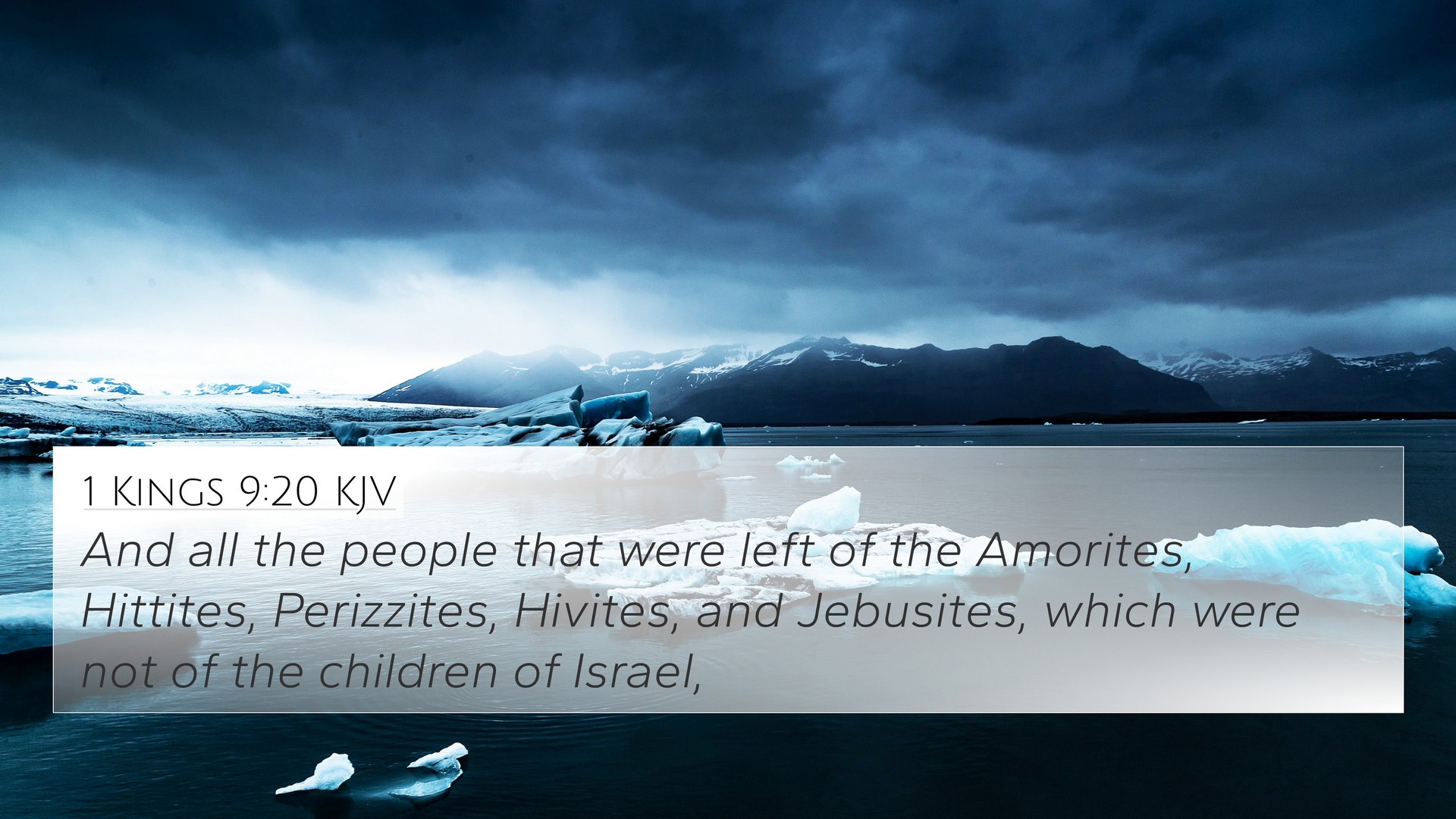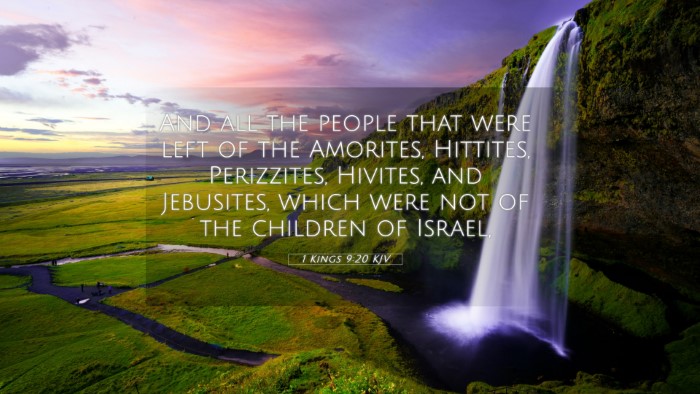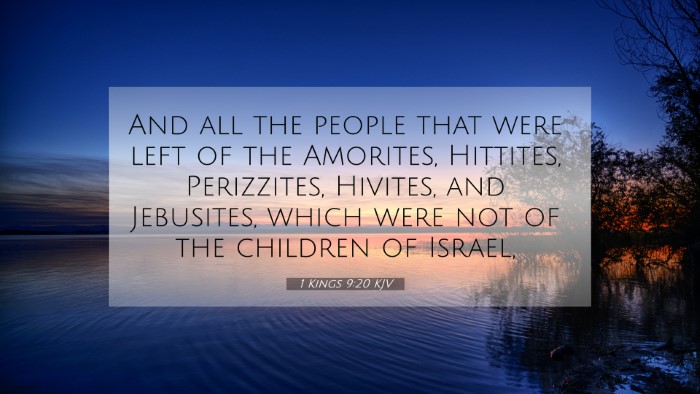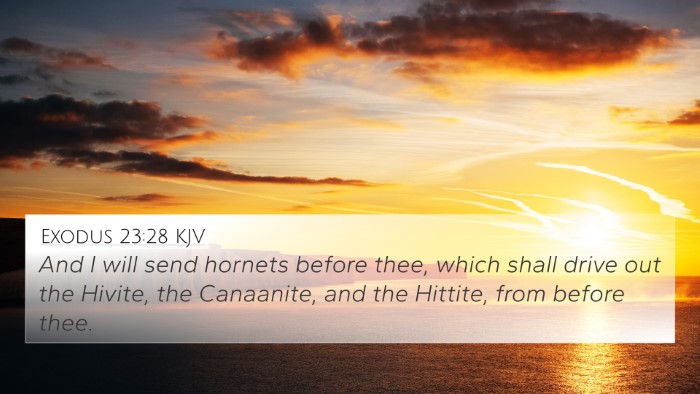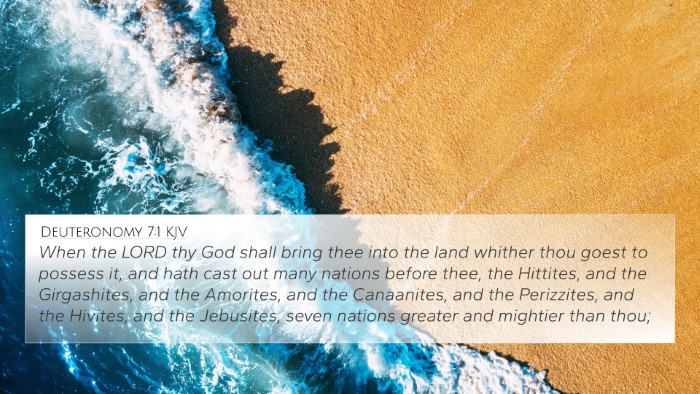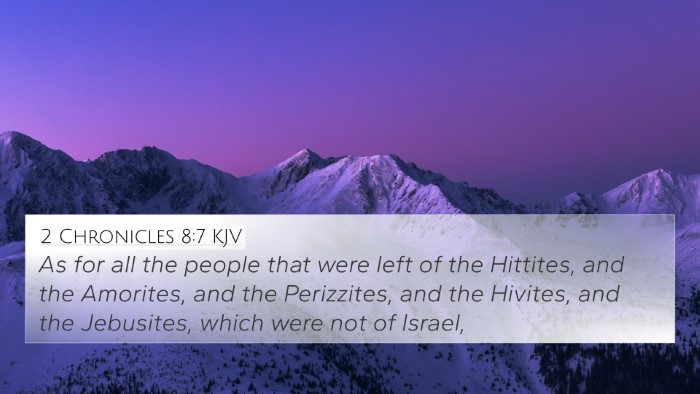Understanding 1 Kings 9:20
Verse: 1 Kings 9:20: "And all the people that were left of the Amorites, Hittites, Perizzites, Hivites, and Jebusites, which were not of the children of Israel,"
Summary of Meaning
This verse highlights the geopolitical landscape that Israel faced during the reign of King Solomon. It specifies the various groups of people who remained in the land despite the conquest of Canaan by the Israelites. The inclusion of these nations underscores the ongoing presence of non-Israelite influences in the area, which can be seen as a foreshadowing of future conflicts and challenges that the nation would encounter.
Commentary Insights
-
Matthew Henry's Commentary: Henry explains that this verse serves as a reminder of the importance of driving out remaining enemies, as they can lead the Israelites astray from their covenant with God. He points out that these nations represent temptation and idolatry, which are significant threats to Israel's spiritual and national integrity.
-
Albert Barnes' Notes: Barnes emphasizes the historical context, explaining that these groups were remnants of previous inhabitants. He notes that their existence posed a risk to Israel's purity and allegiance to Yahweh, as they might introduce pagan practices and beliefs into the Israelite communities.
-
Adam Clarke's Commentary: Clarke provides insights into the cultural implications of these nations remaining in the land. He asserts that their continued presence indicates a lack of complete obedience to God's commands for conquest. Clarke also discusses the potential for intermarriage and cultural blending that could weaken Israel's distinctiveness as God's chosen people.
Significant Cross References
This verse can be connected to several other scriptural references that enhance our understanding:
- Deuteronomy 7:2 - Commands to utterly destroy the nations and their idols.
- Joshua 10:40 - Description of the conquest of various kings and cities in Canaan.
- Judges 1:21 - The failure to drive out the Jebusites from Jerusalem.
- Exodus 23:33 - Warnings against allowing the inhabitants to remain, as they may lead Israel into sin.
- 1 Corinthians 15:33 - “Bad company corrupts good character,” reflecting the dangers of mingling with foreign nations.
- Isaiah 46:6 - Contrasting true worship of God with idol worship of other nations.
- Matthew 5:13 - The call for believers to be the salt of the earth, metaphorically relating to Israel’s role among the nations.
Inter-Biblical Dialogue
The ongoing theme of Israel's interaction with other nations is prevalent throughout Scripture. The tensions created by these relationships often serve as warnings for believers today about the importance of purity and dedication to God. Various passages in both the Old and New Testament illustrate these dynamics, showcasing the need to remain faithful amidst a diverse cultural landscape.
Applications for Today's Readers
This verse urges modern readers to reflect on the influences surrounding them and the necessity of maintaining spiritual integrity. Understanding the historical context of 1 Kings 9:20 fosters a deeper appreciation for the continuous struggles faced by God's people throughout history and remains relevant in discussions on cultural engagement and purity of faith.
Thematic Connections
In the broader context of Biblical themes, various related scriptures discuss the importance of separation from worldly influences:
- Leviticus 20:24-26: God's command for Israel to be a holy people.
- 2 Corinthians 6:14: The call for believers to not be unequally yoked with unbelievers.
- Revelation 18:4: A call to come out of Babylon, representing worldly influences, echoing Israel's challenges with foreign nations.
Conclusion
1 Kings 9:20 serves as both a historical reminder and a spiritual lesson. As we explore connections between Bible verses, we see the layered meanings and continuing relevance of scripture in guiding believers toward faithfulness amidst external pressures. For those engaged in Bible cross-reference studies, understanding the themes and warnings found in this verse enriches the overall biblical narrative.
